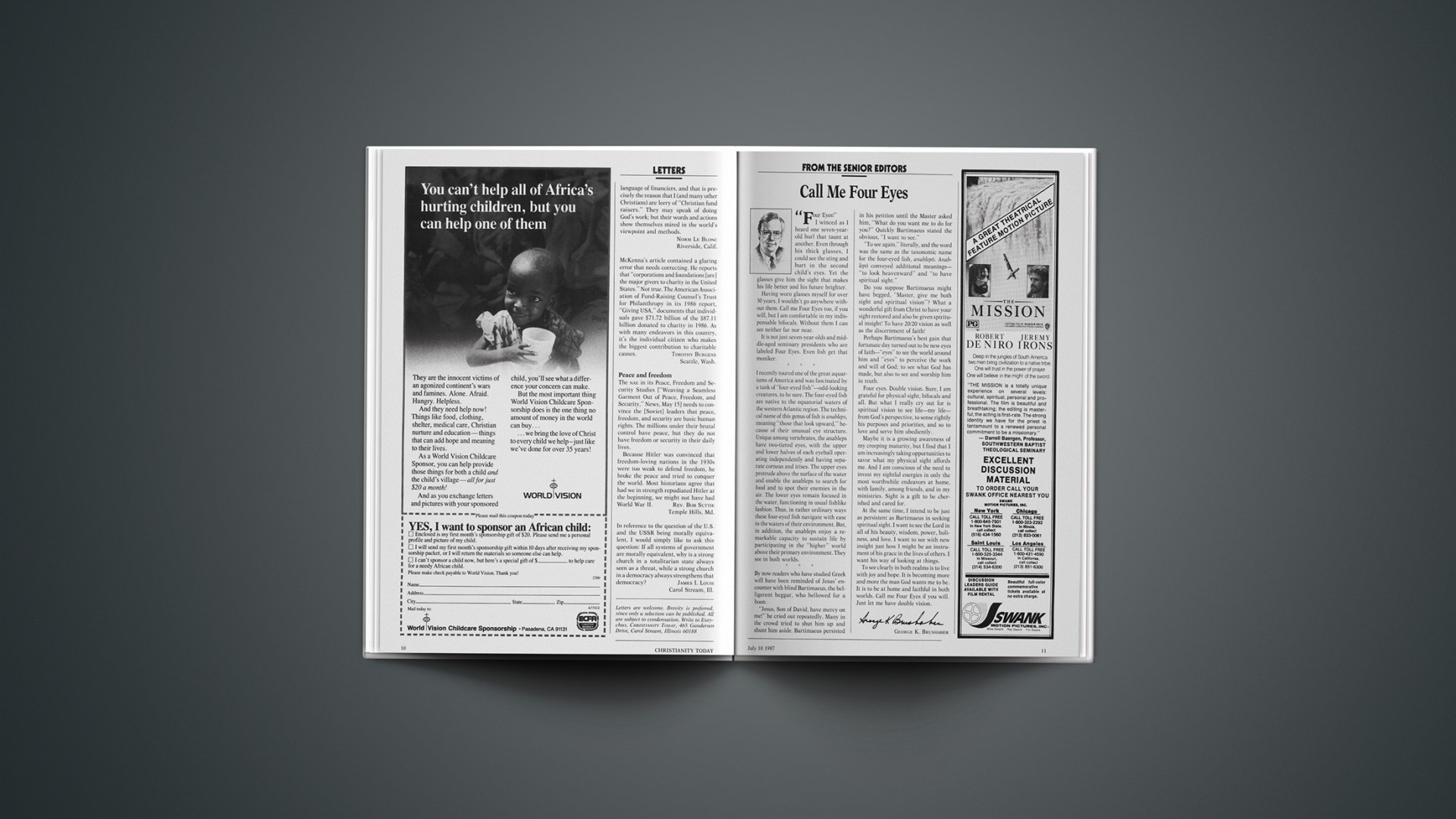“Four Eyes!” I winced as I heard one seven-year-old hurl that taunt at another. Even through his thick glasses, I could see the sting and hurt in the second child’s eyes. Yet the glasses give him the sight that makes his life better and his future brighter.
Having worn glasses myself for over 30 years, I wouldn’t go anywhere without them. Call me Four Eyes too, if you will, but I am comfortable in my indispensable bifocals. Without them I can see neither far nor near.
It is not just seven-year-olds and middle-aged seminary presidents who are labeled Four Eyes. Even fish get that moniker.
I recently toured one of the great aquariums of America and was fascinated by a tank of “four-eyed fish”—odd-looking creatures, to be sure. The four-eyed fish are native to the equatorial waters of the western Atlantic region. The technical name of this genus of fish is anableps, meaning “those that look upward,” because of their unusual eye structure. Unique among vertebrates, the anableps have two-tiered eyes, with the upper and lower halves of each eyeball operating independently and having separate corneas and irises. The upper eyes protrude above the surface of the water and enable the anableps to search for food and to spot their enemies in the air. The lower eyes remain focused in the water, functioning in usual fishlike fashion. Thus, in rather ordinary ways these four-eyed fish navigate with ease in the waters of their environment. But, in addition, the anableps enjoy a remarkable capacity to sustain life by participating in the “higher” world above their primary environment. They see in both worlds.
By now readers who have studied Greek will have been reminded of Jesus’ encounter with blind Bartimaeus, the belligerent beggar, who bellowed for a boon.
“Jesus, Son of David, have mercy on me!” he cried out repeatedly. Many in the crowd tried to shut him up and shunt him aside. Bartimaeus persisted in his petition until the Master asked him, “What do you want me to do for you?” Quickly Bartimaeus stated the obvious, “I want to see.”
“To see again,” literally, and the word was the same as the taxonomic name for the four-eyed fish, anablepō. Anablepō conveyed additional meanings—“to look heavenward” and “to have spiritual sight.”
Do you suppose Bartimaeus might have begged, “Master, give me both sight and spiritual vision”? What a wonderful gift from Christ to have your sight restored and also be given spiritual insight! To have 20/20 vision as well as the discernment of faith!
Perhaps Bartimaeus’s best gain that fortunate day turned out to be new eyes of faith—“eyes” to see the world around him and “eyes” to perceive the work and will of God; to see what God has made, but also to see and worship him in truth.
Four eyes. Double vision. Sure, I am grateful for physical sight, bifocals and all. But what I really cry out for is spiritual vision to see life—my life—from God’s perspective, to sense rightly his purposes and priorities, and so to love and serve him obediently.
Maybe it is a growing awareness of my creeping maturity, but I find that I am increasingly taking opportunities to savor what my physical sight affords me. And I am conscious of the need to invest my sightful energies in only the most worthwhile endeavors at home, with family, among friends, and in my ministries. Sight is a gift to be cherished and cared for.
At the same time, I intend to be just as persistent as Bartimaeus in seeking spiritual sight. I want to see the Lord in all of his beauty, wisdom, power, holiness, and love. I want to see with new insight just how I might be an instrument of his grace in the lives of others. I want his way of looking at things.
To see clearly in both realms is to live with joy and hope. It is becoming more and more the man God wants me to be. It is to be at home and faithful in both worlds. Call me Four Eyes if you will. Just let me have double vision.
GEORGE K. BRUSHABER










